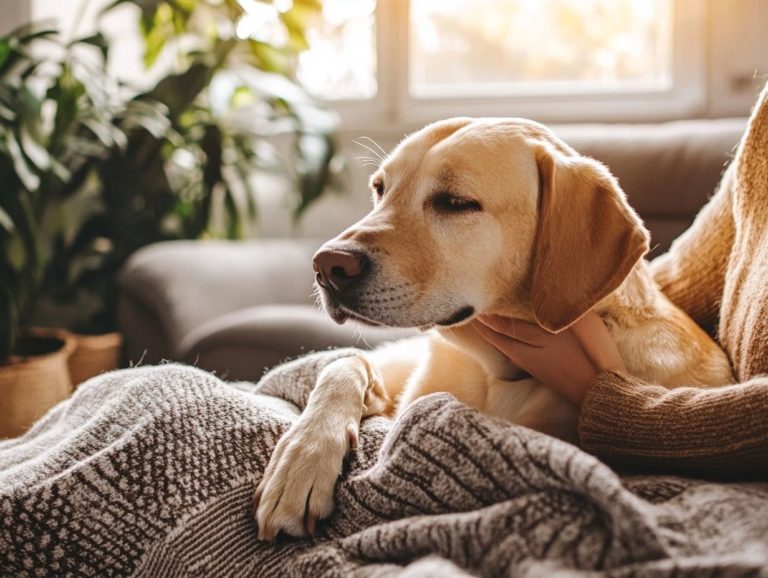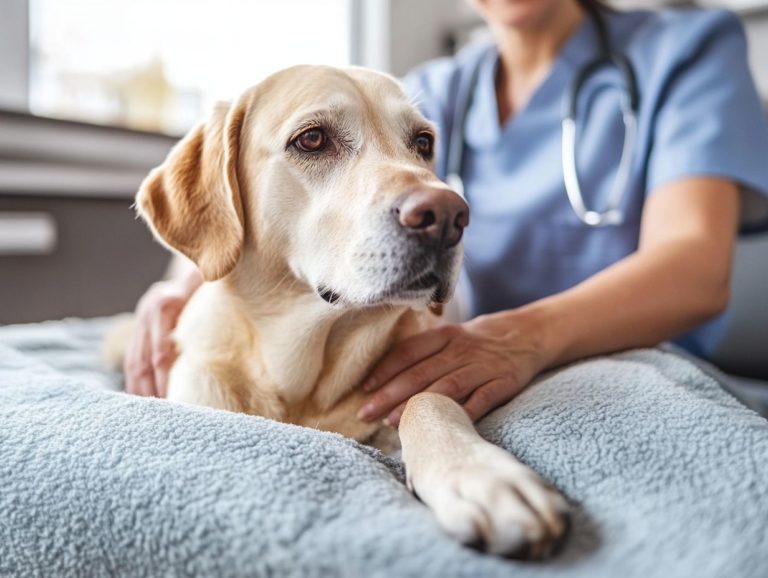The Role of Veterinary Advice in Managing Pet Anxiety
Pets, just like their human counterparts, can experience anxiety that impacts their overall well-being and quality of life.
Recognizing the triggers and signs of pet anxiety is essential for anyone who wishes to create a calm and nurturing environment for their beloved companions. This article delves into the common causes of anxiety in pets, highlights how to spot its symptoms, and outlines when it’s time to consult with a veterinarian.
It explores effective treatment options and offers practical tips for preventing anxiety, ensuring that your furry friend remains secure and content.
Contents
- Key Takeaways:
- The Importance of Managing Pet Anxiety
- Causes of Pet Anxiety
- Signs and Symptoms of Pet Anxiety
- Seeking Veterinary Advice
- Treatment Options for Pet Anxiety
- Preventing Pet Anxiety
- Frequently Asked Questions
- What is the role of veterinary advice in managing pet anxiety?
- Is veterinary advice effective for pet anxiety?
- What kind of advice can I expect from a veterinarian for my pet’s anxiety?
- What are some signs that my pet may be experiencing anxiety?
- How often should I seek veterinary advice for my pet’s anxiety?
- Can I manage my pet’s anxiety without seeking veterinary advice?
Key Takeaways:
- Managing pet anxiety is crucial for both pets and their owners as it can negatively impact their overall well-being and relationship.
- Common triggers and factors that can cause pet anxiety include changes in routine, separation anxiety, and past traumatic experiences.
- If you notice behavioral or physical signs of anxiety in your pet, it is important to consult a veterinarian for proper diagnosis and treatment options.
The Importance of Managing Pet Anxiety
Managing pet anxiety is essential for safeguarding the emotional and physical well-being of your canine companion. Dog anxiety can take on many forms, such as separation anxiety or fear-related responses. It can lead to destructive behaviors and aggression.
Recognizing the significance of this issue benefits your pet. It also elevates the quality of life for pet parents like you, who navigate the complexities of dog anxiety treatment and management.
Understanding the Impact on Pets and Owners
Anxiety in your furry companion can lead to various behavioral issues. These can include excessive barking, destructive chewing, or even withdrawal. Such behaviors create a tense atmosphere at home and can rob you of restful nights. This adds emotional strain to your life as a pet parent.
Consider the all-too-common scenario where your dog becomes anxious during a thunderstorm. You feel utterly powerless as you watch your beloved pet tremble in fear.
To tackle this anxiety effectively, implement strategies like creating a safe space, getting your pet used to stressful situations, or consulting with a veterinarian about training methods. Additionally, understanding the role of diet in pet anxiety can also help. By addressing these challenges together, you and your pet can discover a pathway to greater comfort and contentment.
Causes of Pet Anxiety
Understanding the underlying causes of pet anxiety is crucial for effective treatment. Numerous factors can contribute to canine anxiety disorders, and recognizing these influences is key to fostering your dog’s well-being.
Common Triggers and Factors
Common triggers for dog anxiety include environmental factors like thunderstorms, fireworks, and new experiences such as car rides.
Understanding these triggers is essential for creating a calming environment for your canine companion. For example, when a thunderstorm rolls in, many dogs may exhibit visible distress through pacing, whining, or seeking refuge in tight spaces. Similarly, fireworks can strike fear into their hearts, causing them to tremble or attempt to flee. A seemingly innocent car ride can induce anxiety in dogs who aren t used to the movement or unfamiliar sights and sounds.
By recognizing these scenarios, you can implement effective strategies, like establishing a safe haven at home or utilizing calming aids, significantly enhancing your furry friend’s overall well-being. Consider products like CBD oil for dogs and Innovet products.
Signs and Symptoms of Pet Anxiety
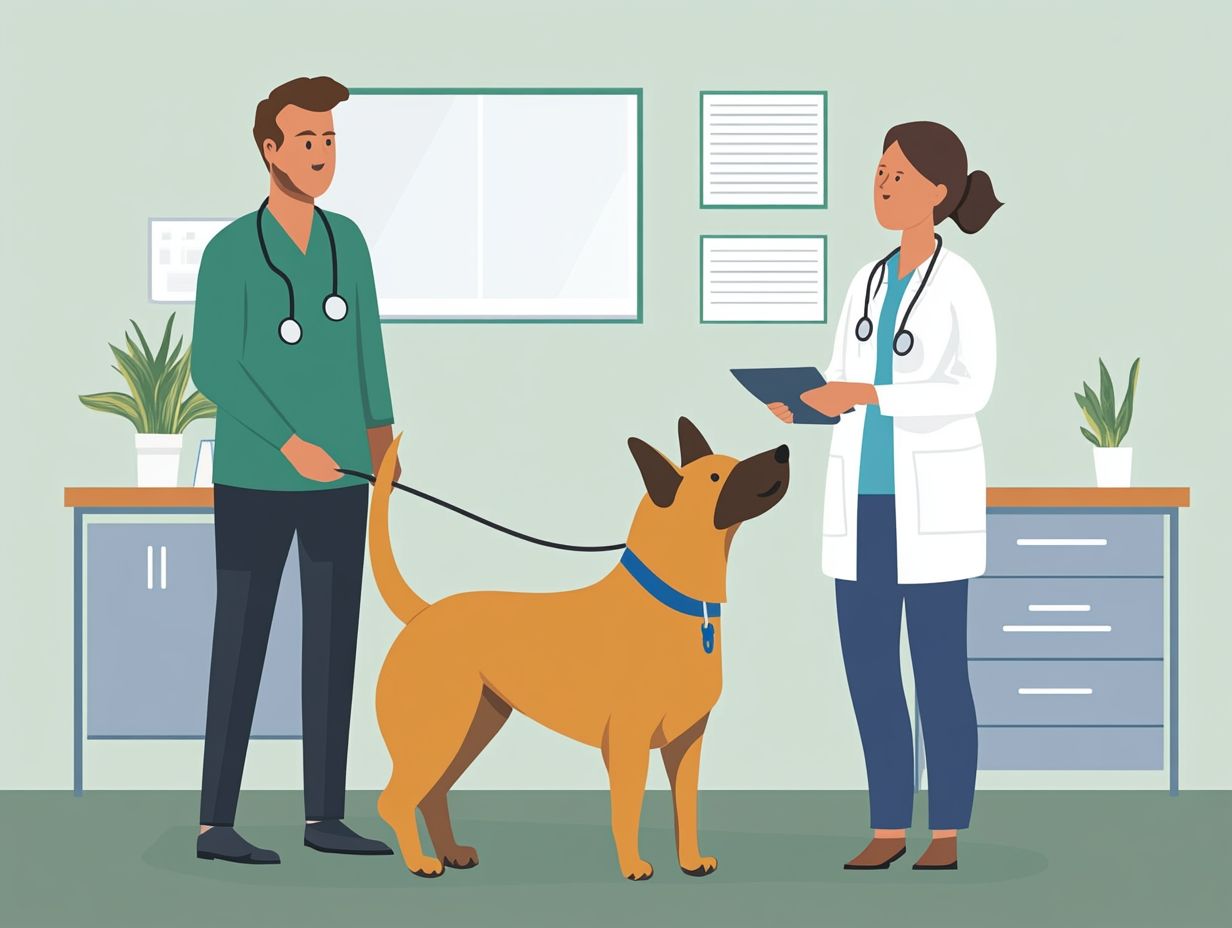
Recognizing the signs and symptoms of your pet’s anxiety is essential for timely intervention and effective treatment. Dogs frequently express their distress through various behavioral issues. Being attuned to these signals can make a significant difference in their well-being.
If you notice these signs in your pet, don t wait reach out to your veterinarian today!
Recognizing Behavioral and Physical Indicators
Behavioral and physical indicators of dog anxiety can vary widely, from subtle shifts in demeanor to more pronounced expressions of distress.
For example, a dog that typically seeks your affection might suddenly withdraw, signaling discomfort or fear. You may notice changes in body language think a lowered head, a tucked tail, or ears that are flattened against the skull each suggesting underlying stress. Physical signs such as excessive panting, drooling, or trembling can further indicate that anxiety is taking a toll on your pet.
It s crucial for pet parents to remain vigilant about these changes, as they can point to anxiety disorders that may require intervention, whether through behavioral training or a consultation with a veterinarian for possible treatment options.
Seeking Veterinary Advice
When faced with persistent dog anxiety, seeking veterinary advice is essential for effective anxiety management and exploring treatment options. Knowing when to consult a professional for pet anxiety can help you understand your dog’s needs better and open the door to tailored solutions that can significantly improve their well-being.
When to Consult a Veterinarian
Knowing when to consult a veterinarian is vital for addressing dog anxiety and understanding what makes an effective pet anxiety counselor to prevent it from escalating into more serious disorders.
If you notice your furry friend excessively panting, pacing, or hiding, these behaviors could be red flags indicating underlying anxiety that needs professional evaluation. Sudden changes in appetite, sleep disturbances, or destructive behaviors are also signs of distress that deserve your immediate attention. Recognizing these signs early can help prevent more severe issues from developing.
Along with seeking medical advice, a veterinarian may recommend a combination of behavioral training and medications to help manage the condition. Understanding these specific scenarios empowers you to act swiftly, enhancing your dog’s overall well-being.
Treatment Options for Pet Anxiety
There are effective treatment options available for addressing dog anxiety. From medications and behavioral therapy to innovative products like CBD oil for dogs, you can choose the best approach to help your furry companion find calm and comfort.
Medications, Behavioral Therapy, and Other Approaches
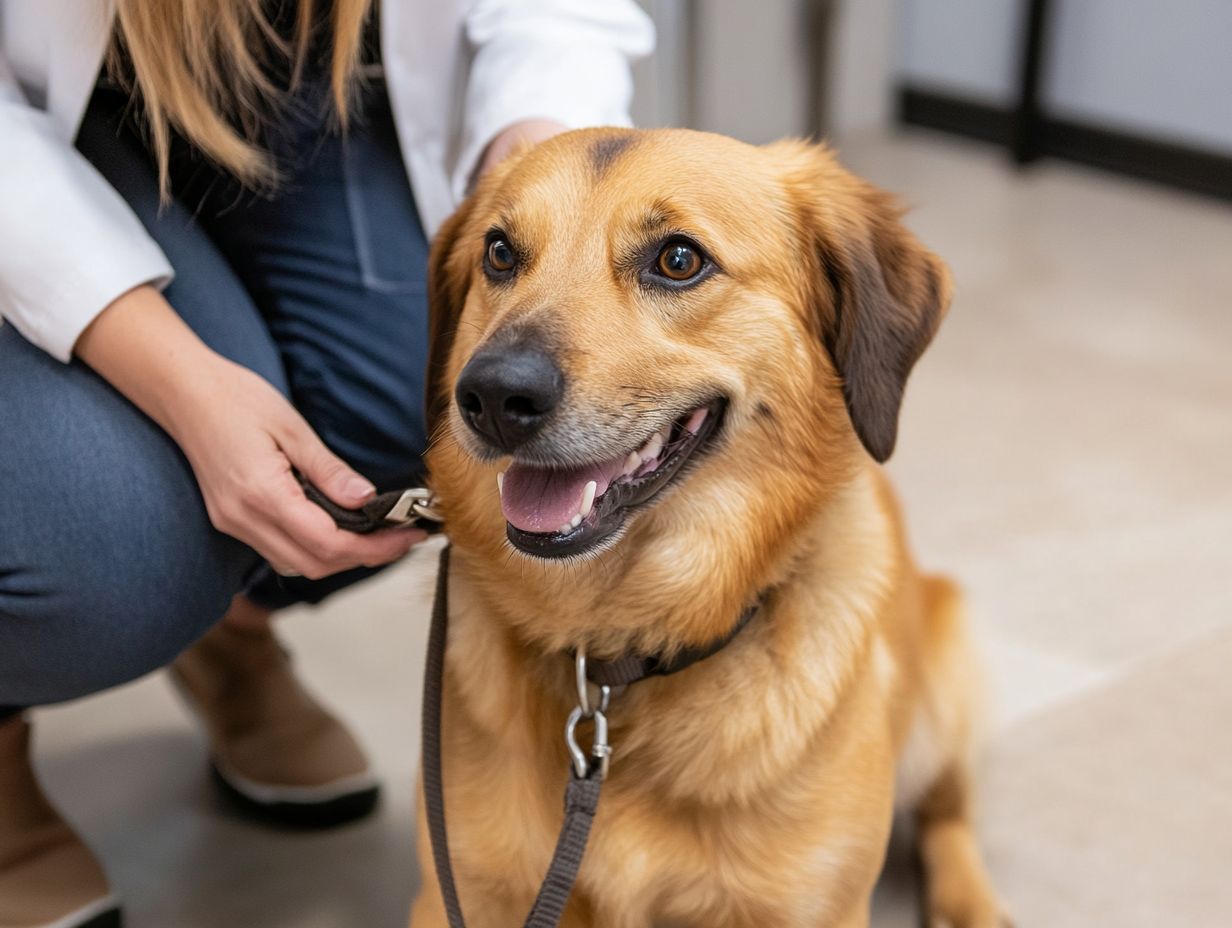
Medications such as selective serotonin reuptake inhibitors (SSRIs), fluoxetine, clomipramine, and benzodiazepines are pivotal in treating dog anxiety. These medications are often used alongside behavioral therapy and innovative products like Innovet.
These medications target neurotransmitters chemicals in the brain that help regulate mood balancing mood and alleviating anxiety. For example, SSRIs increase serotonin levels, enhancing your dog s overall sense of well-being. Clomipramine, a tricyclic antidepressant, is especially effective for separation anxiety. Stay informed as a pet owner your dog’s well-being depends on it!
Incorporating behavioral therapy offers a comprehensive approach, equipping your dog with coping strategies to manage anxiety more effectively. Holistic options like pheromone diffusers, calming collars, and natural supplements can complement medication, creating a well-rounded solution tailored to your dog’s unique needs.
Preventing Pet Anxiety
Preventing dog anxiety is a crucial element of responsible pet ownership. By implementing early intervention through effective training strategies, you can significantly alleviate anxiety symptoms in your furry companion.
Tips for Reducing Stress and Promoting Well-being
Implementing effective strategies to reduce stress can significantly enhance the well-being of dogs experiencing anxiety and behavioral issues. You’ll see your furry friend feel more secure and relaxed when you take proactive steps to create a serene environment.
Start by establishing a consistent daily routine that includes exercise, mental stimulation, and designated quiet times. Training techniques, especially positive reinforcement, empower your dog and build their confidence, alleviating anxiety.
Consider making environmental adjustments like providing a cozy space with soft bedding and soothing music to minimize stress. Engaging in bonding activities, such as interactive play or gentle grooming sessions, strengthens your connection and reassures your dog while promoting their emotional well-being.
Frequently Asked Questions
What is the role of veterinary advice in managing pet anxiety?
Veterinarians play a crucial role in helping pet owners manage their pet’s anxiety. They provide professional advice, support, and treatment options.
Is veterinary advice effective for pet anxiety?
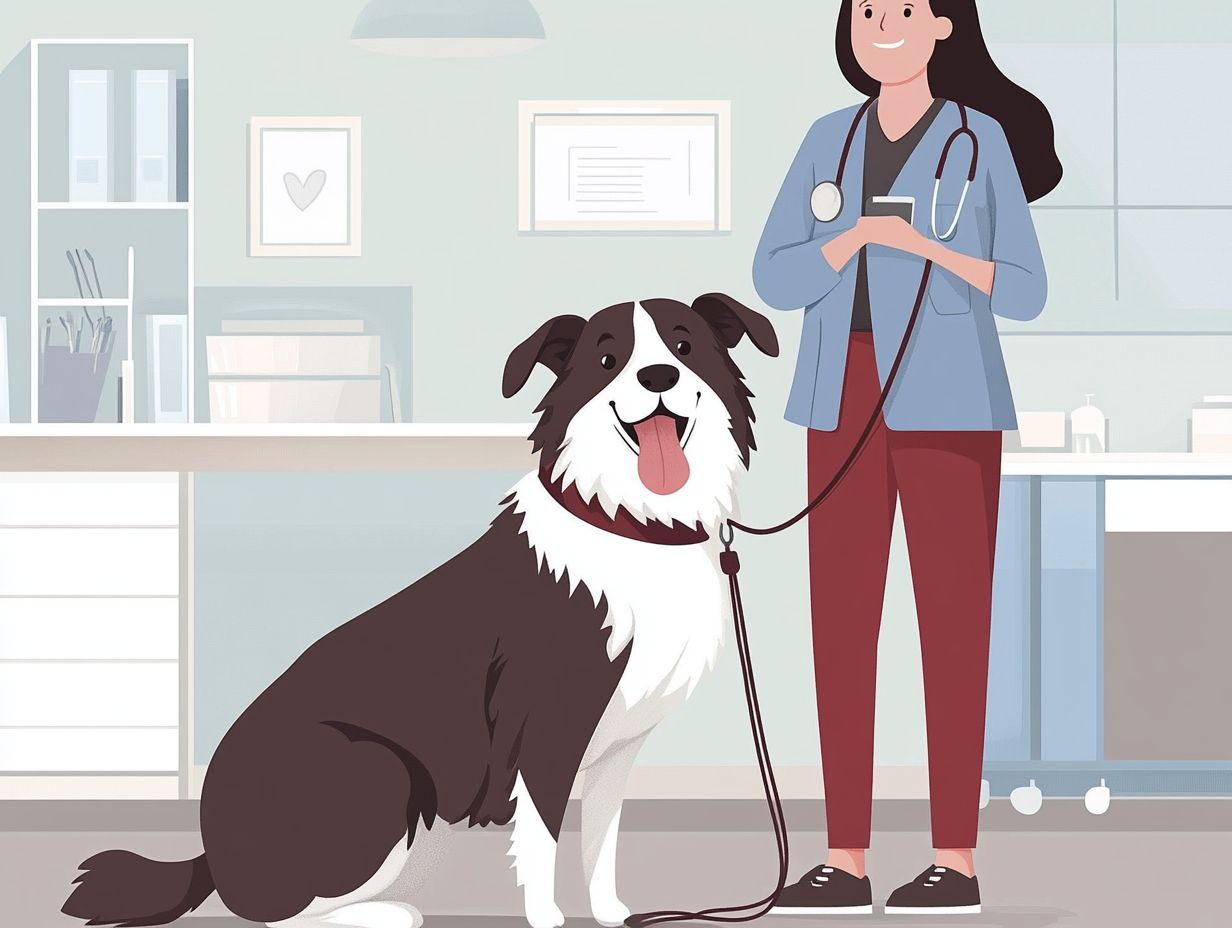
Yes, veterinary advice can significantly help in managing pet anxiety. Vets are trained to understand animal behavior and can offer effective solutions to alleviate anxiety in pets.
What kind of advice can I expect from a veterinarian for my pet’s anxiety?
Veterinarians may suggest ways to change your pet’s behavior, medications, or a combination of both to help manage your pet’s anxiety. They may also recommend environmental changes or relaxation techniques to calm your pet.
What are some signs that my pet may be experiencing anxiety?
Signs of anxiety in pets include excessive barking, destructive behavior, aggression, clinginess, hiding, loss of appetite, and changes in bathroom habits. If you notice any of these behaviors, it’s important to consult with a veterinarian.
How often should I seek veterinary advice for my pet’s anxiety?
If your pet has been diagnosed with anxiety, regularly following up with your veterinarian is essential to ensure that the treatment plan is working effectively. Additionally, learning about best practices for pet owners and anxiety can provide valuable insights. They may adjust the treatment plan if necessary.
Can I manage my pet’s anxiety without seeking veterinary advice?
While there are things you can do at home to help manage your pet’s anxiety, be sure to consult a veterinarian as soon as possible for the best care. They can provide professional guidance and help you understand different types of pet anxiety experts who can offer more effective treatment options to help your pet cope with anxiety.



